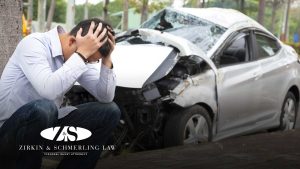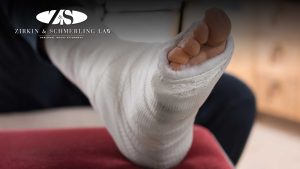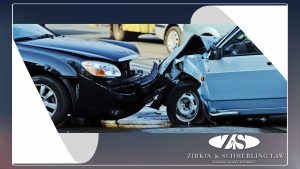CAR ACCIDENT CASE SETTLEMENT RESULTS
Maryland Car Crash Lawyer
Have you recently sustained injuries from an accident?

If you’ve been in an accident, you may have already received a call from an insurance company pressuring you to sign something quickly. This means you need immediate legal advice on handling insurance companies’ claims, what to do with the accident report, and your rights in this situation from a Maryland Car Crash Lawyer.
The strength of your car accident lawsuit depends on how well your Maryland car accident attorney gathers and presents the facts of the car crash and the impact of your injuries. When a severe injury, fatality, or impaired driving is involved, it’s essential to hire an experienced Maryland car and auto accident lawyer to help you get the compensation you deserve.
You need Zirkin & Schmerling, Maryland Car Crash Lawyers, to review your case and assess the strength of your car crash victims’ accident claims to advise you on the best path forward.
Contact Zirkin and Schmerling auto accident attorneys to schedule a free case evaluation today at 410-753-4611.

A Maryland Car Crash Lawyer Will Help Build Auto Accident Cases
After a car accident, your first job is to focus on healing from mental and physical wounds, not arguing with insurance companies. You deserve help from a Maryland personal injury lawyer who can take quick action to ensure the responsible party pays for the personal injury and property damage they caused.
The Maryland Car Accident Lawyers at Zirkin & Schmerling are here to help you obtain fair compensation.
Insurance companies are reluctant to compensate you fully; they love it when you don’t engage an accident lawyer in Maryland. Zirkin & Schmerling will help you hold the right person responsible and get a fair insurance settlement. During this challenging time, we want to help you receive fair compensation that enables you to move on with your life.
Why You Need a Maryland Car Crash Lawyer
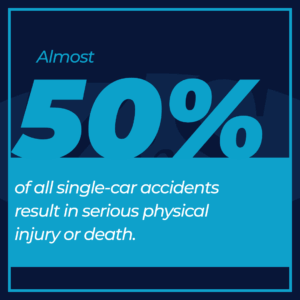
Although traffic fatalities and motor vehicle crashes happen every day, they are still incredibly traumatic events, especially for the people involved. Whether the collision was caused by someone driving drunk, talking on their cell phone, speeding, or simply not paying attention to the road, there can be severe consequences for your family and long-lasting damage to you.
Don’t let the insurance company determine how much compensation you deserve. Get the experienced Zirkin & Schmerling team of car accident attorneys on your side.
The value of your case depends significantly on your car accident claims’ circumstances, such as if it was a hit-and-run. Hiring an experienced Maryland car accident claims attorney helps you evaluate your legal options with your auto and car accident claims worth in mind to be in the best position and win fair compensation for your injuries.
A Zirkin & Schmerling Maryland car accident lawyer will calculate your auto accident worth, determine if there was contributory negligence, and fight for your right to fair compensation.
Do you know that more than 120,000 auto accidents are reported to police in Maryland every year?
Or that 50,000 people suffer injuries each year on Maryland roads? If you are unfortunate enough to be in one of these accidents, you could have serious physical injuries and financial loss.
30% of all auto accidents in Maryland result in injuries to drivers and passengers, making auto collisions one of the state’s leading causes of personal injury.
These injuries can be as minor as a few cuts and scratches or as significant as permanent brain damage or death. Each year, more than 500 traffic deaths occur in Maryland traffic crashes.
Types of Car Accidents We See in Maryland
As you travel the roads of Maryland, you can encounter conditions that can cause a car accident. Each type impacts your vehicle, personal well-being, and accident valuation.
The common types of car accidents we see in the state of Maryland are similar to those across America:
Single Car Crashes
When only one driver is involved, it’s known as a single-vehicle accident or single-car crash. In a typical single-car accident, the driver leaves the road at a reasonably high speed and cannot stop before hitting a stationary object like a fence, light pole, guard rail, tree, or other roadside object. This doesn’t include hitting someone, which would be classified as a pedestrian accident.
The National Highway Safety Administration estimates up to 100,000 single-vehicle accidents occur due to drowsy and distracted driving. Impairment due to drugs or alcohol and speeding can be other culprits. Whatever the cause, almost 50% of all single-car accidents result in serious physical injury or death.
Pedestrian Accidents
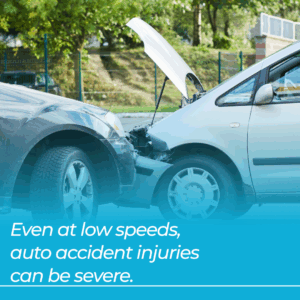
In a pedestrian accident, a moving vehicle hits a person on or near a road. Lawmakers define “pedestrian” in several ways -the exact definition may vary by city ordinance- and may include walkers, runners, bicyclists, scooter users, people using wheelchairs, and children playing in traffic.
Automobile accidents that involve pedestrians are some of the most severe and heartbreaking traffic accidents. Even at very low speeds, auto accident injuries can be severe. Pedestrian and auto accidents often occur in high-population areas like the streets of Baltimore and Maryland’s other big cities, where drivers may be distracted and confused by the volume of moving objects around them.
Although the tendency is to automatically blame the car’s driver and view the pedestrian as the injured victim, this is not always true. A pedestrian may be jaywalking, drunk, wandering in traffic, or doing something unlawful. They may be held totally or partially at fault, depending on the circumstances of the accident.
Types of Car Injuries in Maryland Auto Accidents
Many types of injuries can result from an auto collision. Some are apparent from the moment of impact, like a broken bone, and others become apparent days or weeks afterward, like persistent back or neck pain. The injured person must seek medical care immediately following auto accidents to protect their rights to file personal injury lawsuits.
Keep track of medical expenses and any transportation costs incurred while seeking treatment so they can be presented to your accident lawyer and insurance adjusters later.
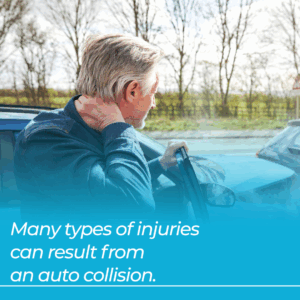
Broken Bone Injuries
Broken bone injuries, commonly called fractures, occur when the force applied to a bone is more significant than its strength. The impact and sudden deceleration can lead to fractures in various bones, such as the arms, legs, ribs, or pelvis. The severity of these injuries varies, ranging from hairline fractures to more complex breaks requiring surgical intervention.
Spinal Cord Injuries
Spinal cord injuries result from trauma to the spinal cord, often caused by high-impact accidents like car crashes. These injuries can lead to partial or complete paralysis, impacting the individual’s motor and sensory functions. The long-term consequences of spinal cord injuries vary, affecting the quality of life and necessitating extensive medical and rehabilitative care.
Traumatic Brain Injuries
A traumatic brain injury (TBI) occurs when external forces cause damage to the brain tissue. In car accidents, TBIs can result from the head striking a hard surface or from the sudden acceleration and deceleration forces affecting the brain inside the skull. Depending on the severity of traumatic brain injuries, they can lead to cognitive impairments, memory loss, and various neurological issues, requiring comprehensive medical attention and rehabilitation.
Neck Injuries
Neck injuries, such as whiplash, are common in car accidents, especially rear-end car collisions. Whiplash occurs when the head is forcefully jerked backward and forward, causing strain on the neck muscles and ligaments. While whiplash is often considered a soft tissue injury, it can result in chronic pain, stiffness, and headaches, necessitating ongoing medical care and physical therapy.
Scarring & Disfigurement

Car accidents can lead to scarring and disfigurement, mainly when individuals sustain burns, lacerations, or other injuries requiring surgical intervention. The physical and emotional toll of visible scars can impact an individual’s self-esteem and quality of life, often necessitating not only medical treatment but also psychological support and counseling.
Emotional and Psychological Injuries
Beyond physical injuries, car accidents can cause emotional and psychological trauma. Individuals may experience symptoms such as anxiety, depression, post-traumatic stress disorder (PTSD), or a general fear of driving. Addressing these injuries often requires therapeutic interventions, counseling, and support to help individuals cope with the emotional aftermath of the accident.
Shoulder Injuries
A side-impact car collision, rear-end car collision, or head-on car collision often leads to shoulder injuries, with torn rotator cuffs being a prevalent outcome. This injury involves the separation of tendons in the arm from the joint and socket of the shoulder, resulting in significant pain and impaired mobility. Recovery from a torn rotator cuff typically involves a combination of rest, physical therapy, and, in severe car accident cases, surgical intervention.

What Happens After An Accident?

After an auto accident, two things happen: The law determines who is responsible according to the rules of the road, and financial responsibility is assigned.
According to the Transportation Article of the Maryland Annotated Code, drivers have specific responsibilities on the road. They may be liable for the accident if they fail to meet these responsibilities. In terms of financial obligation, tort law will be used. It’s a set of civil rules that holds someone financially and legally liable for damages that result from negligent conduct.
In the days following your car accident, the authorities and insurance companies will work to assign fault for what happened. The at-fault driver will be legally responsible for monetary compensation if you have been injured. You’ll need to submit a car accident claim to the insurance company, wait while they investigate, and find out what they offer you.
Keep in mind an insurance company will always offer you far less than the amount you deserve under the law.
With the help of a Maryland car accident lawyer or personal injury lawyer, you can refuse the offer from the insurance company and file a personal injury lawsuit against the other driver who is at fault. Accident lawyers can take the case before a judge or jury and let them decide what you deserve. You will likely be much happier with the result.
If you need legal help, contact a Maryland auto accident lawyer at 410-753-4611 to schedule a free case evaluation today.
What Are The Most Dangerous Intersections in Baltimore?
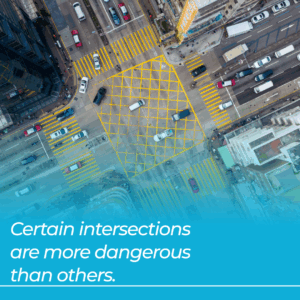
Driving in Maryland can be quite an adventure, between the big-city congestion of Baltimore and the proximity to Washington, D.C. The risk is highest at intersections, where 40% of all accidents occur. When drivers approach an intersection, they must deal with multiple sources of movement, analyze information, and be ready for unpredictability.
As Maryland Car Crash Lawyers, we know that in the Baltimore County area, certain intersections are more dangerous than others.
These five intersections are the most hazardous you’ll encounter, according to the National Highway Travel Safety Administration:
#5: South Monroe Street/Washington Boulevard
Just south of Carroll Park, the intersection of South Monroe Street and Washington Boulevard creates confusion for drivers. With four lights and five lanes of traffic arriving from four directions, drivers sometimes fail to yield when turning left. A typical year sees 20 or more accidents at this intersection.
#4: Orleans/Gay/Ensor Streets
In western Baltimore, just west of the Jones Falls Expressway, is the congested area of Orleans, Gay, and Ensor Streets. Anyone unfamiliar with how the streets split at this place can easily be caught off guard. More than 30 accidents occur here in a typical year.
#3: Jones Falls Expressway/West Cold Spring Lane
The split exit creates congestion and confusion where West Cold Spring Lane joins the Jones Fall Expressway. When workday traffic hits the expressway at 5 p.m., traffic clogs, and drivers grow impatient. It’s common to have more than 30 accidents here in a year, especially sideswipes.
#2: Jones Falls Expressway/Northern Parkway
Another Jones Falls Expressway exit with plenty of collisions is the Northern Parkway. Vehicles traveling at a high rate of speed on both highways come together where the two meet. Almost every time of day is busy and risky here, contributing to more than 35 crashes in a typical year.
#1: Gwynns Falls Parkway/Reisterstown Road
Finally, statistics show that the most dangerous intersection in Maryland are Gwynns Falls Parkway and Reisterstown Road. Anyone driving through this area has probably seen at least one other driver ignoring traffic signals, accelerating impatiently, and generally creating havoc. There are usually more than 45 crashes at this intersection each year.
If you need legal help, contact our Auto Accident Law attorney at 410-753-4611 to schedule a free case evaluation today.

Possible Damages Awarded for a Car Accident
You may be awarded various types of damages after an auto accident. Consider whether you have suffered any of the following damages and discuss them with your car accident lawyer or personal injury attorney.
Medical Bills

In the aftermath of a car accident, individuals often have the right to pursue compensation for the medical bills incurred due to injuries sustained. This involves meticulously documenting and presenting evidence of all medical expenses related to emergency care, surgeries, rehabilitation sessions, medications, and the ongoing medical treatment crucial for a complete recovery. The proactive approach taken by the injured parties underscores their commitment to ensuring that every aspect of their medical treatment is accounted for and compensation for medical bills is comprehensive.
Pain and Suffering
Victims resiliently advocate for comprehensive compensation beyond the mere acknowledgment of tangible costs. They actively present a compelling narrative that articulates the profound pain and suffering experienced as direct consequences of the accident. This extends to detailing the immediate trauma, persistent discomfort, and emotional anguish endured throughout the challenging process of physical and emotional recovery.
Short-Term Lost Wages
Injured parties can pursue reimbursement for lost wages with a proactive stance toward financial recovery during the challenging rehabilitation period. A thorough car accident lawyer will help document time off due to ongoing medical treatments or rehabilitation efforts. The assertive pursuit of compensation underscores their commitment to restoring financial stability in the face of unforeseen challenges.
Loss of Long-Term Income
Individuals, recognizing the potential long-term consequences of serious injuries, can present their case for compensation to offset future lost wages. This involves strategically providing evidence highlighting the enduring impact on career trajectories, promotional prospects, and overall earning capacity. The proactive approach taken by those seeking compensation actively aims to secure acknowledgment and restitution for the potential loss of future income and financial opportunities.
Permanent Physical Impairment
Car accident victims may seek compensation by filing personal injury claims with a car accident lawyer for permanent physical impairments that decrease functioning in their daily lives. This includes actively seeking restitution for disabilities, chronic pain, and enduring physical limitations resulting from the accident. By actively engaging in the Maryland car accident personal injury claims process, auto accident attorneys can build a personal injury lawsuit to support injury victims who will never fully recover.
Scarring and Disfigurement
A car accident victim may be able to claim compensation for visible scars and disfigurement and may pursue restitution, addressing both the physical pain and suffering emotional distress caused by the altered physical appearance. This involves a proactive stance in seeking compensation for necessary cosmetic procedures to mitigate scarring and restore a sense of normalcy. The active pursuit of compensation reflects a commitment to addressing both the visible and hidden scars resulting from the traumatic incident.
Mental Distress and Cost of Mental Health Treatment
Beyond physical injuries, car crash victims may be able to seek compensation for mental distress and the financial burden of mental health treatment. This proactive approach involves articulating the psychological toll, encompassing anxiety, depression, and other mental health challenges stemming from the accident. By actively engaging with the legal process, individuals strive to ensure that the often-overlooked aspects of mental well-being are acknowledged and adequately compensated.
Property Damage
Individuals actively engage in seeking compensation for the repair or replacement of their damaged vehicles and personal property. This involves proactive steps toward addressing the costs of fixing or substituting vehicles, personal belongings, and other items adversely affected in the collision. The assertive pursuit of restitution for property damage reflects a commitment to restoring personal well-being and the tangible assets impacted by the accident.
Loss of Enjoyment in Life
Serious injuries can limit one’s ability to enjoy life to its fullest. An experienced personal injury attorney can build a case for you to receive compensation for the inability to engage in activities, hobbies, or experiences you enjoyed before the accident. The proactive pursuit of compensation reflects a determination to restore a sense of normalcy and joy beyond the physical realm of recovery.
Defendants Commonly Involved in Maryland Car Crash
From individual drivers to semi-truck operators, many types of defendants are involved in lawsuits over car accidents.
Some examples of the kinds of people you might sue include:
Individual Drivers
If you are in a collision with a negligent driver, you’ll either pursue the other driver’s insurance company for reimbursement or file a lawsuit against them. Of course, you have to hope that the other driver has the proper auto insurance in the first place. About 12% of Maryland drivers are uninsured.
Commercial Vehicle Operators
When operating a commercial vehicle, like a delivery truck or company vehicle, their employer’s auto insurance company may be responsible for damages they suffer from an accident. These situations can quickly become complex, and you should consult a Maryland car accident attorney for advice.
Semi-Truck Operators
If you are the unfortunate victim of an accident between your passenger vehicle and a semi-truck, there’s a high likelihood that you will be seriously injured. Semi-trucks are extremely heavy and can cause catastrophic damage to people and property. Maryland has specific laws for commercial heavy-duty trucks, including the names of nationwide companies that may be held liable.
Government Drivers
State and local governments can be sued for accidents their employees cause while driving government-owned vehicles. It’s also possible that the government can be held liable for poorly maintained roads, walkways, traffic devices, and so forth. Under Maryland law, the state must keep its citizens reasonably safe.
Uber & Lyft Drivers (Ridesharing)
Rideshare companies, like Uber and Lyft, now have drivers who use Maryland roads. When a rideshare driver is a defendant, they fall into a mixed category where they may have individual liability or the rideshare company may be held responsible. For example, if an accident occurs when they are using the car for personal errands, the rideshare company would not be involved, and the personal injury claim would be the responsibility of their own insurance company.


How Long Do You Have to File a Car Accident Lawsuit in Maryland?
If you’ve been in an accident in Maryland, don’t let too much time pass before investigating your legal options.
The statute of limitations, or time limit, on how long you can wait before filing a lawsuit is three years.
We Have Car Insurance Claim Experience
At Zirkin & Schmerling, we’ve seen it all. Nothing an insurance company will do can surprise us. We’ve seen insurance companies offer lowball compensation to injured people, try to rush and bully people into fast decisions, and fail to provide the resources people truly need to recover from a car accident. When you partner with us, you have an ally who will stand up to the insurance company and get what you deserve.
Presumed Liability
Auto accident laws in Maryland presume liability for rear-end collisions. In other words, if a stopped vehicle is struck from behind by another car, the moving vehicle is automatically assumed to be at fault. There are exceptions to this general rule, so it’s essential to document the accident as thoroughly as possible, even if you think you may be at fault. It is also imperative to consult with a Maryland car accident lawyer immediately. Read our comprehensive article for more about who pays for medical bills and expenses related to car accident cases.
Breach Of Contract Cases
You may be able to make several other claims, depending on the details of your car, truck, or motorcycle accident. If you are involved in an automobile accident with an uninsured or underinsured motorist, auto accident personal injury protection laws in Maryland allow you to file a claim against your insurance company. If they refuse to compensate you adequately as required by your insurance contract, an experienced auto accident lawyer in Maryland can file a “breach of contract” case against them to get fair compensation for your automobile accident.
Wrongful Death and Survival Action
In the most tragic auto accident cases, the family of a car accident victim may file a wrongful death or survival action under auto accident law in Maryland. Wrongful death cases are brought on behalf of a deceased victim’s beneficiaries, such as spouses, children, or parents.
A survivor action can be brought by the estate of an individual who has died in a car accident. In this instance, the estate steps in for the deceased and sues for damages like medical expenses, pain, and suffering. You can find more information about what your auto accident might be worth by reading our in-depth article.
Contact an Experienced Maryland Car Crash Lawyer
If you’ve been in an accident, contact our personal injury attorneys at 410-753-4611 to schedule a free evaluation of your Maryland car accident claim.
After a car accident in Maryland, you’ll need to act fast to select a Maryland car accident lawyer who can work as your advocate.
Think about the following essential considerations:
- Experience. Do the other auto accident lawyers have the credentials to represent you? Do the accident lawyers have years of experience with serious motor vehicle accidents, motorcycle crashes, or your situation?
- Results. Good Baltimore car accident lawyers have a solid history of getting high-dollar results for their clients. Can your car accident lawyer name seven-figure verdicts they have received for their clients on car injury cases?
- Reputation. The insurance companies are very familiar with the names of prominent Maryland car accident attorneys. You need a name to get them shaking in their boots and ready to give you the best deal possible. That name is Zirkin & Schmerling.
To learn more, contact Maryland Car Crash Lawyers, Zirkin & Schmerling today at 410-753-4611 for an experienced car accident attorney in Maryland.



